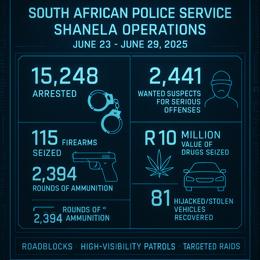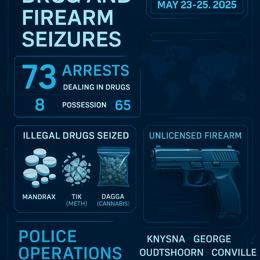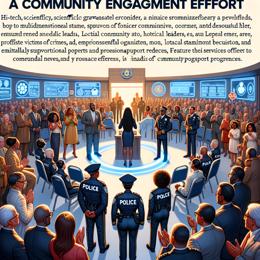Picture: for illustration purposes
Alarm Bells Ring Over Dwindling Police Reservist Numbers in South Africa
The South African Police Service (SAPS) is facing a substantial challenge as new figures reveal a dramatic decrease in the number of police reservists across the country. According to a recent statement by Democratic Alliance (DA) Member of Parliament, Andrew Whitfield, there are now just 3,502 volunteers assisting SAPS, a stark contrast to the 52,000 recorded during the 2011/2012 financial year.
The decline of these vital volunteers, who once made a significant contribution to law enforcement efforts, has become a point of contention. Whitefield pointed out that Police Minister Bheki Cele has failed to capitalize on the opportunity to reinforce the police force through a proactive recruitment drive for reservists. In seeking answers, Whitefield addressed a set of pivotal questions to Cele, probing the root causes of such a severe drop in numbers.
In his response, Minister Cele outlined several factors contributing to the reduction of reservists. He noted that volunteers may choose to terminate their service due to various reasons, including gaining full-time employment or changes in personal circumstances. Cele also referenced a transitional phase starting from 2014, where a considerable number of reservists were found to be inactive despite being registered in the system.
As the SAPS battles with shrinking personnel numbers, the impact of the dwindling reservist program could not be more pronounced. Whitfield underscored the gravity of the situation by describing the decline as a "devastating blow to the fight against crime." Police reservists have historically augmented the SAPS force, playing pivotal roles in not only routine law enforcement but also serving as an additional buffer during critical periods of high criminal activity.
The implications of these findings are clear: action must be taken to reverse the decline in reservist numbers. Whitefield has stressed that it is imperative for the police to initiate an urgent recruitment drive to fortify their ranks. He has called for leadership change within the SAPS, expressing a need for a skilled and serious Minister who can implement the necessary reforms to rejuvenate the force. The suggestion is clear — if the current Minister is unable to fulfill these demands, then reconsideration of his position might be necessary to revitalize SAPS competency and effectiveness.
While debate continues over the most suitable strategies to combat the challenges of crime in South Africa, one thing remains certain: the reserve force has been a critical element of support for SAPS, and its restoration is crucial for ensuring the safety and security of all South Africans. The SAPS and its leadership are now faced with the task of rejuvenating this valuable resource in the battle against crime.










